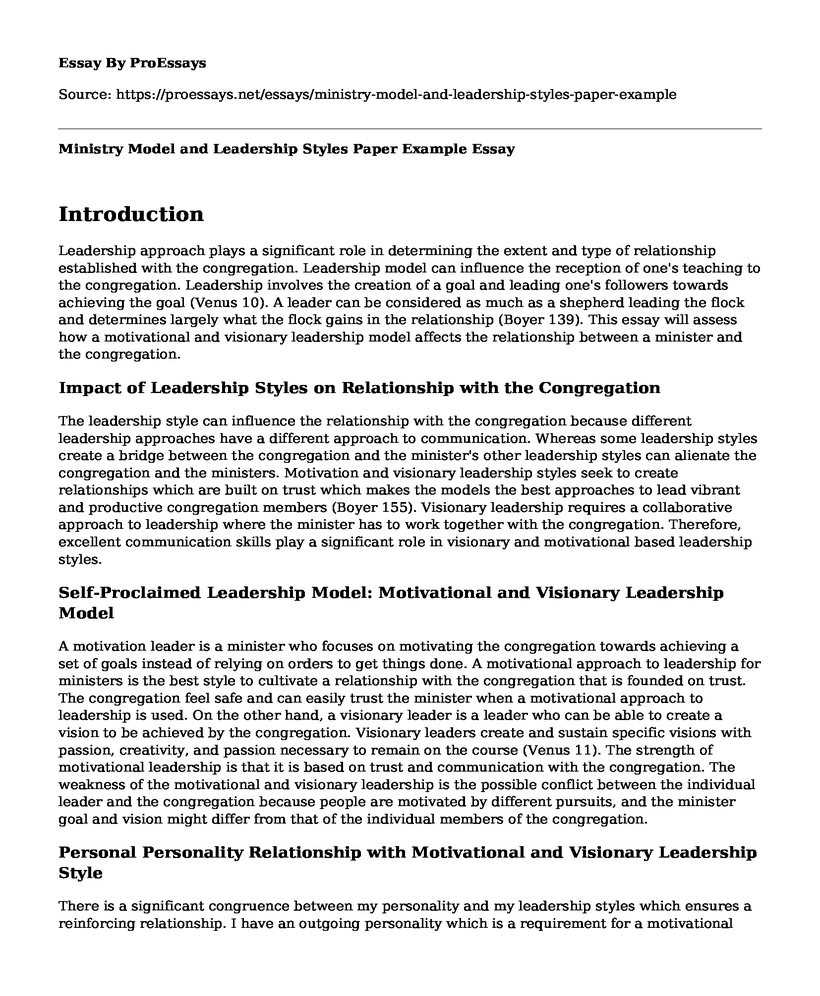Introduction
Leadership approach plays a significant role in determining the extent and type of relationship established with the congregation. Leadership model can influence the reception of one's teaching to the congregation. Leadership involves the creation of a goal and leading one's followers towards achieving the goal (Venus 10). A leader can be considered as much as a shepherd leading the flock and determines largely what the flock gains in the relationship (Boyer 139). This essay will assess how a motivational and visionary leadership model affects the relationship between a minister and the congregation.
Impact of Leadership Styles on Relationship with the Congregation
The leadership style can influence the relationship with the congregation because different leadership approaches have a different approach to communication. Whereas some leadership styles create a bridge between the congregation and the minister's other leadership styles can alienate the congregation and the ministers. Motivation and visionary leadership styles seek to create relationships which are built on trust which makes the models the best approaches to lead vibrant and productive congregation members (Boyer 155). Visionary leadership requires a collaborative approach to leadership where the minister has to work together with the congregation. Therefore, excellent communication skills play a significant role in visionary and motivational based leadership styles.
Self-Proclaimed Leadership Model: Motivational and Visionary Leadership Model
A motivation leader is a minister who focuses on motivating the congregation towards achieving a set of goals instead of relying on orders to get things done. A motivational approach to leadership for ministers is the best style to cultivate a relationship with the congregation that is founded on trust. The congregation feel safe and can easily trust the minister when a motivational approach to leadership is used. On the other hand, a visionary leader is a leader who can be able to create a vision to be achieved by the congregation. Visionary leaders create and sustain specific visions with passion, creativity, and passion necessary to remain on the course (Venus 11). The strength of motivational leadership is that it is based on trust and communication with the congregation. The weakness of the motivational and visionary leadership is the possible conflict between the individual leader and the congregation because people are motivated by different pursuits, and the minister goal and vision might differ from that of the individual members of the congregation.
Personal Personality Relationship with Motivational and Visionary Leadership Style
There is a significant congruence between my personality and my leadership styles which ensures a reinforcing relationship. I have an outgoing personality which is a requirement for a motivational and visionary leader. Besides, I am a motivational speaker, and I have an idealistic character which makes it easy to create goals for the congregation and motivate them to achieve the set goals. The only pitfall faced when relating with the congregation members is the possible language barrier and differing visions and objectives. The most successful approach I use when faced with the opposition is talking and negotiating with those opposed with my vision instead of criticizing them. Over the years, I have noted that being democratic and allowing dialogue helps increase success and reconcile congregation members (Venus 90). Therefore, dialogue and allowing open criticism is a strength, especially when dealing with a religious congregation.
Authority and Power
Authority and power are used interchangeably in different contexts, but they are different. Power refers to the ability to influence other people whereas authority is the claim of legitimacy to wield power over a group of people. In the ministry, appropriate authority is founded on the principles of the bible that a leader should be a servant to the people (Boyer 139). Therefore, coercive and domineering authority is not acceptable in ministry. Authority can only be exercised with integrity if it is legitimate and follows the existing values such as transparency and honor. Therefore, a leader can use power effectively to present the needs of the congregation. Leaders who are coercive, self-centred and controlling are very likely to abuse power to achieve their desires. Confidentiality is a benchmark of professional ethics because it means that one can be trusted with greater responsibilities. In ministry, confidentiality attracts congregation trust with greater tasks (Trull and Carter 43). Confidentiality can only be broken if the information revealed to a leader poses a significant threat to the life of other people. Since confidentiality is both a legal and ethical issue, one can disclose information when required by a court of law.
Works Cited
Boyer, Stuart W. "The Development and Proliferation of Trust in Small Groups." (2019). Print. 134-169 [Internet Source]. Retrieved from https://books.google.co.ke/books?id=pKd6DwAAQBAJ&pg=PA168&dq=carter+and+trull+2004&hl=en&sa=X&ved=0ahUKEwjKkub3xN_eAhXHIcAKHZLAAOIQ6AEILzAB#v=onepage&q=carter%20and%20trull%202004&f=false
Trull, Joe E, and James E. Carter. Ministerial Ethics: Moral Formation for Church Leaders. Grand Rapids, MI: Baker Academic, 2004. Print. [Internet Source]. Retrieved from https://books.google.co.ke/books?id=yq1LqjgUxJ0C&printsec=frontcover&dq=carter+and+trull+2004&hl=en&sa=X&ved=0ahUKEwjKkub3xN_eAhXHIcAKHZLAAOIQ6AEIKDAA#v=onepage&q=carter%20and%20trull%202004&f=false
Venus, Merlijn. Demystifying visionary leadership: In search of the essence of effective vision communication. No. EPS-2013-289-ORG. 2013. [Internet Source]
Watt, Willis M. "Relational principles for effective church leadership." Journal of Leadership Education 13.2 (2014): 125-139.
Cite this page
Ministry Model and Leadership Styles Paper Example. (2022, Oct 06). Retrieved from https://proessays.net/essays/ministry-model-and-leadership-styles-paper-example
If you are the original author of this essay and no longer wish to have it published on the ProEssays website, please click below to request its removal:
- Information Sensitivity and Protection of Data Essay
- Paper Example on Leadership Education
- Alibaba's Strategy Analysis of Relationship With Stakeholders Paper Example
- Managing and Leading Teams Essay
- Sound Leadership: Crucial for Healthcare Quality Outcomes - Essay Sample
- Research Paper on Trump's Shithole Remark Sparks Global Outrage
- Free Essay Sample: Risks Faced Australian Government







